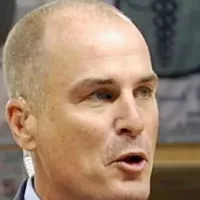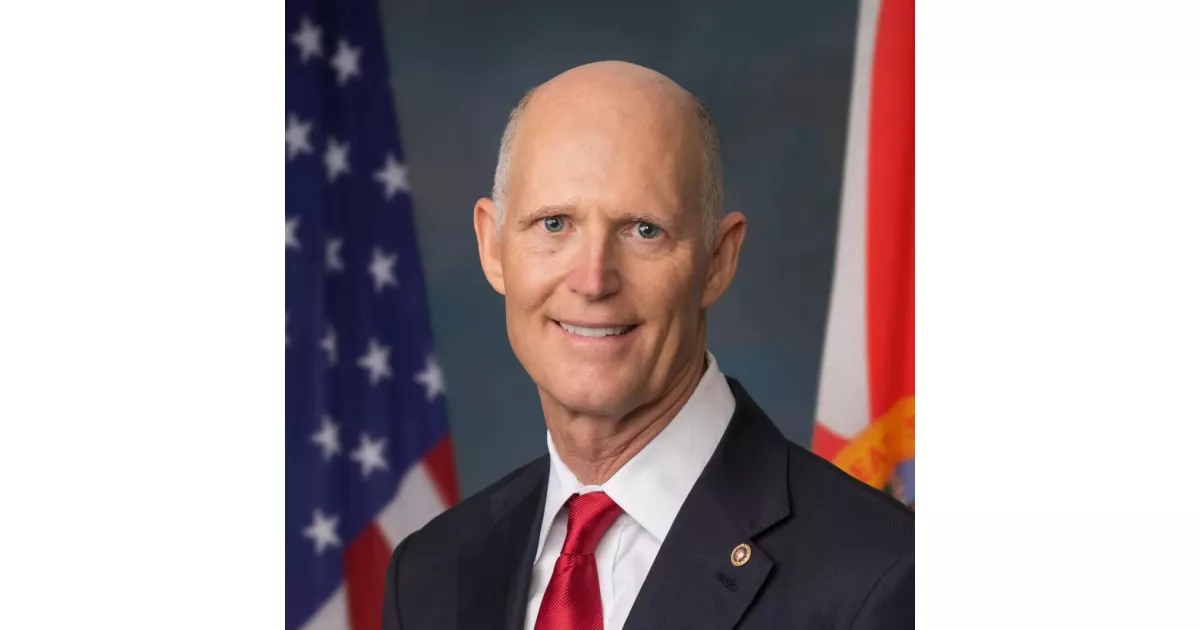Discover the career path of Rick Scott, from the first major opportunity to industry-changing achievements.
Richard Lynn "Rick" Scott is an American politician currently serving as the senior United States Senator from Florida since 2019. He is a member of the Republican Party. Prior to his senatorial role, Scott served as the 45th Governor of Florida for two terms, from 2011 to 2019. Beyond his political career, Scott has experience as an attorney and businessman. He is also a Navy veteran.
1978: Licensed to Practice Law
In 1978, Rick Scott was licensed to practice law by the Texas Bar after earning a juris doctor degree from Southern Methodist University.
April 1987: Attempt to Buy Hospital Corporation of America (HCA)
In April 1987, Rick Scott attempted to buy the Hospital Corporation of America (HCA) for $3.85 billion but the offer was declined.
1987: Co-founded Columbia Hospital Corporation
In 1987, Rick Scott co-founded Columbia Hospital Corporation after serving in the U.S. Navy and becoming a law firm partner.
1988: Founded Columbia Hospital Corporation
In 1988, Rick Scott and Richard Rainwater each invested $125,000 to create Columbia Hospital Corporation.
1989: Columbia Hospital Corporation Owned Four Hospitals
By the end of 1989, Columbia Hospital Corporation owned four hospitals with a total of 833 beds.
1992: Columbia Stock Purchase of Basic American Medical
In 1992, Columbia Hospital Corporation made a stock purchase of Basic American Medical, which owned eight hospitals.
September 1993: Columbia Acquired Galen Healthcare
In September 1993, Columbia Hospital Corporation acquired Galen Healthcare, which had about 90 hospitals, in a $3.4 billion stock purchase.
1994: Columbia Merged with HCA
In 1994, Columbia Hospital Corporation merged with HCA, forming the largest for-profit health care company, and Rick Scott became CEO of Columbia/HCA.
July 1997: Columbia/HCA Purchased Controlling Interest in America's Health Network
In July 1997, Columbia/HCA Healthcare purchased a controlling interest in America's Health Network (AHN), but pulled out of the deal because Scott and Vandewater were terminated.
1997: Resigned as CEO of Columbia/HCA
In 1997, Rick Scott was pressured to resign as chief executive of Columbia/HCA due to the company defrauding Medicare, Medicaid, and other federal programs.
1997: Launched Richard L. Scott Investments
In 1997, after leaving Columbia/HCA, Rick Scott launched Richard L. Scott Investments.
1998: Purchased Stake in CyberGuard Corporation
Between 1998 and 2001, Rick Scott purchased 50% of CyberGuard Corporation for approximately $10 million.
1998: Scott Led Investment in AHN
In 1998, Rick Scott and Vandewater led a group of investors who gave America's Health Network (AHN) a major infusion of cash.
1999: AHN Available in 9.5 Million Homes
By early 1999, America's Health Network (AHN) was available in 9.5 million American homes.
1999: AHN Merged with Fit TV
In mid-1999, America's Health Network (AHN) merged with Fit TV, becoming The Health Network.
September 2000: WebMD Planned to Relaunch The Health Network
In September 2000, WebMD planned to relaunch The Health Network as WebMD Television, but announced cutbacks and restructuring.
January 2001: News Corp. Regained Ownership of The Health Network
In January 2001, News Corp. regained 100% ownership of The Health Network.
September 2001: Fox Sold The Health Network to Discovery Health Channel
In September 2001, Fox Cable Networks Group sold The Health Network to the Discovery Health Channel for $155 million in cash and a 10% equity stake.
2001: Purchased Stake in CyberGuard Corporation
Between 1998 and 2001, Rick Scott purchased 50% of CyberGuard Corporation for approximately $10 million.
2001: Co-founded Solantic
In 2001, Rick Scott co-founded Solantic, based in Jacksonville, Florida, with Karen Bowling.
2002: Solantic Opened First Urgent Care Center
In 2002, Solantic opened its first urgent care center providing services such as immunizations, physicals, and drug screening.
February 2005: Purchased Continental Structural Plastics, Inc.
In February 2005, Rick Scott purchased Continental Structural Plastics, Inc. (CSP) in Detroit, Michigan.
2005: Provided Initial Funding to Alijor.com
In 2005-2006, Rick Scott provided initial funding of $3 million to Alijor.com.
July 2006: CSP Purchased Budd Plastics
In July 2006, Continental Structural Plastics (CSP), which Rick Scott purchased earlier, acquired Budd Plastics from ThyssenKrupp.
2006: Scott Announced Plans for Solantic
In 2006, Rick Scott announced his plans to establish a national brand of medical clinics for Solantic.
2006: Co-founded Alijor.com
In 2006, Rick Scott co-founded Alijor.com with his daughter Allison, to allow healthcare providers to post pricing and insurance information.
August 2007: Solantic Receives $40 Million Investment
In August 2007, Solantic received a $40 million investment from a private equity firm. The company announced plans to open 35 clinics by the end of 2009, projecting annual revenues of $100 million, a significant increase from the current $20 million.
May 2008: Purchased Drives
In May 2008, Rick Scott purchased Drives, a designer and manufacturer of heavy-duty drive chain-based products and assemblies.
February 2009: Scott Forms Conservatives for Patients' Rights
In February 2009, Rick Scott founded Conservatives for Patients' Rights (CPR), intending to influence Democrats to adopt free-market principles in health care legislation.
March 2009: Scott Gives $5 Million to CPR Ad Campaign
As of March 2009, Rick Scott had contributed approximately $5 million towards a planned $20 million advertising campaign by Conservatives for Patients' Rights (CPR).
April 9, 2010: Scott Announces Candidacy for Governor of Florida
On April 9, 2010, Rick Scott officially announced his candidacy for the Republican nomination for governor of Florida.
2010: Ran for governor as immigration hard-liner
In 2010, Rick Scott ran for governor as an immigration hard-liner, favoring similar laws as Arizona's SB 1070 and calling for police to check individuals' immigration status.
2010: Elected Governor of Florida
In 2010, Rick Scott was elected as the governor of Florida after defeating Bill McCollum in the Republican primary and Alex Sink in the general election.
2010: NRA-PVF Endorsed Scott
In 2010, the NRA-PVF endorsed Rick Scott for governor, citing his support for gun rights.
January 4, 2011: Scott Takes Office as Governor of Florida
On January 4, 2011, Rick Scott assumed office as the 45th governor of Florida after defeating his opponent by approximately 68,000 votes.
February 2011: Withdrew request to approve redistricting amendments
In February 2011, Rick Scott withdrew a request to the United States Department of Justice to approve constitutional amendments banning gerrymandering, potentially delaying the redistricting plan.
February 16, 2011: Rejected Federal Funding for High-Speed Rail
On February 16, 2011, Rick Scott rejected $2.3 billion in federal funding for high-speed rail between Tampa and Orlando, citing concerns about cost overruns.
March 1, 2011: Senators Petitioned Supreme Court Over Rail Funds
On March 1, 2011, two Florida state senators filed a petition with the Florida Supreme Court to compel Rick Scott to accept the rail funds.
March 2011: Initiated PortMiami Dredging Project
In March 2011, Rick Scott moved to have the Florida Department of Transportation amend its work plan to include $77 million for dredging PortMiami to a depth of 50 feet to accommodate Panamax-sized vessels.
October 2011: Scott Announces Reelection Run in 2014
In October 2011, Rick Scott declared his intention to seek reelection in 2014. His political funding committee had raised $28 million for his campaign as of May 2014.
2011: Scott appointed Pasco County Sheriff
In 2011, Rick Scott appointed Chris Nocco as Pasco County Sheriff.
2011: Became Governor of Florida
In 2011, Rick Scott began his service as the 45th Governor of Florida, serving two terms until 2019.
2011: Opposed In-State Tuition for Illegal Immigrants
In 2011, Rick Scott opposed giving in-state tuition for illegal immigrants.
2011: Signed Firearm Owners' Privacy Act
In 2011, Rick Scott signed the Firearm Owners' Privacy Act (informally called "Docs vs. Glocks"), restricting doctors from inquiring about patients' gun ownership.
2013: Vetoed legislation on temporary driving licenses for DACA-eligible immigrants
In 2013, Rick Scott vetoed legislation that would have given DACA-eligible immigrants the ability to obtain temporary driving licenses.
June 2014: Scott Spends Heavily on Ads Attacking Crist
As of early June 2014, Rick Scott had spent nearly $13 million since March on television ads targeting former governor Charlie Crist, then the likely Democratic nominee. These ads led to a decline in Crist's favorability.
September 2014: Scott's TV Ad Spending Exceeds $35 Million
By late September 2014, Rick Scott's television advertising expenditure had surpassed $35 million in his campaign efforts.
September 2014: Crist Seeks Support from Black Voters
In September 2014, Charlie Crist aimed to gain significant support from Florida's Black voters. A poll indicated his support among Black voters was 72%, which was below the 90% believed to be needed to defeat Rick Scott.
November 4, 2014: Scott Wins Reelection Against Crist
On November 4, 2014, Rick Scott and Carlos Lopez-Cantera were victorious in the general election against Charlie Crist and Annette Taddeo-Goldstein by 64,000 votes. The Libertarian candidates received 223,356 votes.
2014: Moderated stance on illegal immigration
By 2014, PolitiFact wrote that Rick Scott had "abandoned promises to get tough on illegal immigration," as he moderated his views over time.
2014: Signed DREAMers in-state tuition bill
In 2014, Rick Scott reversed course and signed a bill giving DREAMers in-state tuition in an effort to place limits on how much state institutions can raise tuition each year.
2014: Re-elected as Governor of Florida
In 2014, Rick Scott was re-elected as Governor of Florida, defeating former governor Charlie Crist.
2014: NRA-PVF Endorsed Scott
In 2014, the NRA-PVF endorsed Rick Scott for governor, stating that he had "signed more pro-gun bills into law–in one term–than any other governor in Florida history".
2016: Scott Endorses Trump and Chairs Pro-Trump PAC
In 2016, after Donald Trump won the Florida primary, Rick Scott endorsed Trump. He also chaired a pro-Trump super PAC during the 2016 election.
June 9, 2017: Signed Expanded Stand-Your-Ground Law
On June 9, 2017, Rick Scott signed an expanded version of Florida's stand-your-ground law into law.
2017: Scott said people with preexisting conditions should be protected.
In 2017, Rick Scott said that people with preexisting conditions should be protected.
February 2018: A+ Rating from NRA Political Victory Fund
As of February 2018, Rick Scott held an A+ rating from the NRA Political Victory Fund (NRA-PVF), indicating a record of supporting gun rights.
February 2018: Support for gun control measures after Stoneman Douglas shooting
In February 2018, after the Stoneman Douglas High School shooting in Parkland, Florida, Rick Scott voiced support for raising the minimum age to purchase a firearm to 21 and banning bump stocks, requesting $500 million for mental health and school safety programs.
March 2018: Marjory Stoneman Douglas High School Public Safety Act passed and signed
In March 2018, the Florida Legislature passed the Marjory Stoneman Douglas High School Public Safety Act, which incorporated many of the measures Rick Scott supported, including raising the minimum age for buying firearms to 21 and banning bump stocks. Scott signed the bill into law on March 9, 2018. That same day, the National Rifle Association filed a lawsuit in federal court challenging the law's provision banning gun sales to people under 21.
April 9, 2018: Scott Announces U.S. Senate Run
On April 9, 2018, Rick Scott officially announced that he would challenge incumbent Democratic U.S. Senator Bill Nelson in the 2018 election, following months of speculation.
June 2018: Opposed Trump Administration Family Separation Policy
In June 2018, Rick Scott opposed the Trump administration's family separation policy, sending a letter to the United States secretary of health and human services, stating that he did not agree with the practice.
June 2018: Declined to criticize Trump administration on Obamacare
In June 2018, when the Trump administration sought to remove provisions of Obamacare protecting people with preexisting conditions, Rick Scott declined to criticize the administration, saying he did not know enough about it to comment.
November 18, 2018: Scott Prevails in Senate Race After Recount
On November 18, 2018, Florida elections officials announced that Rick Scott had prevailed in the Senate race against Bill Nelson after a recount. Scott received 50.05% of the vote to Nelson's 49.93%, with a margin of victory of 10,033 votes out of 8.19 million votes cast.
December 4, 2018: Scott Announces He Will Finish His Term as Governor
On December 4, 2018, Rick Scott's office announced that he would finish his term as governor and not resign early.
2018: Spoke in Favor of Path to Citizenship for DREAMers
By 2018, Rick Scott spoke in favor of giving DREAMers a path to citizenship.
2018: Supported high-speed rail project
In 2018, Rick Scott reversed course and supported a high-speed rail project between Tampa and Orlando when the company All Aboard Florida sought taxpayer-backed funding. He and his wife had invested at least $3 million in the parent company of All Aboard Florida, which had made donations to Scott's political campaigns.
2018: Scott Supports All Aboard Florida
In 2018, Rick Scott supported All Aboard Florida's efforts to build high-speed rail and obtain taxpayer financing, despite previously rejecting federal funding for high-speed rail early in his governorship.
2018: Won U.S. Senate Election
In 2018, Rick Scott won the U.S. Senate election against incumbent Democrat Bill Nelson after a mandatory recount.
2018: Ran for U.S. Senate
In 2018, Rick Scott, barred by term limits from running for reelection as governor, ran for the U.S. Senate.
January 3, 2019: Start of Senate Term
On January 3, 2019, the Senate term for the 116th Congress began.
January 8, 2019: Took Office as U.S. Senator
On January 8, 2019, Rick Scott took office as a U.S. Senator from Florida, following the expiration of his term as governor.
January 2019: Encouragement to Declare National Emergency for Border Wall
In January 2019, Rick Scott encouraged then-President Donald Trump to declare a national emergency to build a border wall if Congress would not provide the necessary funds.
February 2019: Applauding the National Emergency Declaration
In February 2019, Rick Scott applauded Donald Trump's decision to declare a national emergency to build a border wall.
2019: Became U.S. Senator from Florida
In 2019, Rick Scott became the senior United States Senator from Florida, a position he has held since then.
May 2020: Vote on FISA Amendment
In May 2020, Rick Scott voted for an amendment that would have required federal intelligence and law enforcement agencies to obtain federal court warrants when collecting web search engine data from American citizens under the Foreign Intelligence Surveillance Act (FISA).
September 18, 2020: Scott Calls for Swift Replacement of Ginsburg
After Supreme Court Justice Ruth Bader Ginsburg's death on September 18, 2020, Rick Scott sided with Senator Mitch McConnell and called for her replacement to be voted on before that year's presidential election.
November 10, 2020: Scott Selected for NRSC Chairmanship
On November 10, 2020, Rick Scott was formally selected as the chairman of the National Republican Senatorial Committee (NRSC), succeeding Senator Todd Young.
2020: Scott Wealthiest Member of Congress
Based on financial disclosure reports covering 2020, it was reported that Scott has a minimum net worth of just over $200 million, making him the wealthiest member of Congress.
2020: Objections to Electoral Seating
In 2020, after Donald Trump lost the presidential election and made false claims of fraud, Rick Scott voted to object to seating the electors from Pennsylvania but voted against the objection for Arizona. Both objections were rejected by the Senate.
March 2021: Opposition to American Rescue Plan Act
In March 2021, Rick Scott voted against the American Rescue Plan Act and called upon Florida and other states to reject federal assistance from the package after it passed.
May 2021: Vote Against January 6 Commission
In May 2021, Rick Scott voted against creating an independent commission to investigate the January 6 United States Capitol attack.
February 22, 2022: Release of 11-Point Plan to Rescue America
On February 22, 2022, Rick Scott released his controversial 11-Point Plan to Rescue America. The plan included proposals such as forcing all Americans to pay some income tax, sunsetting all federal legislation within five years (potentially affecting Social Security and Medicare), closing the United States Department of Education, and completing the Mexico–United States border wall.
March 10, 2022: Vote Against Spending Bill with Ukraine Aid
On March 10, 2022, Rick Scott was among 31 Republicans who voted against a $1.5 trillion spending bill, that included $13.6 billion in military assistance for Ukraine's defense. He argued the bill was filled with lawmakers' "pet" projects.
June 8, 2022: Release of Revision of 11-Point Plan
On June 8, 2022, Rick Scott released a revision of his 11-Point Plan, replacing the income tax proposal with a proposal not to provide government assistance to "able-bodied Americans under 60 [without] young children or incapacitated dependents" who are not working. He also added a 12th point clarifying that the plan "cuts taxes."
June 2022: Support for Overturning Roe v. Wade
In June 2022, Rick Scott supported the overturning of Roe v. Wade, stating it was based on "flawed legal reasoning" and that the Supreme Court had defended "human dignity" and federalism.
November 14, 2022: Scott Challenges McConnell for Senate Leadership
On November 14, 2022, Rick Scott announced he would challenge Mitch McConnell for the position of Senate Minority Leader in the 118th United States Congress. He said that the status quo was broken and big change was needed.
2022: Sponsored or Co-Sponsored Senate Bills
In 2022, Notable Senate bills that Scott has sponsored or co-sponsored include the Sunshine Protection Act, which makes daylight saving time in the United States permanent; the PROTECT Kids Act, which cuts federal funding to schools that allow students to change their preferred pronouns and keep their sexual orientation from their parents; the National Defense Authorization Act for Fiscal Year 2022; and the END FENTANYL Act.
2022: Voted against Bipartisan Safer Communities Act
In 2022, Rick Scott voted against the Bipartisan Safer Communities Act, a gun reform bill introduced following the school shooting at Robb Elementary School in Uvalde, Texas.
2022: Scott voted against the Inflation Reduction Act.
In 2022, Rick Scott voted against the Inflation Reduction Act, which allows Medicare to negotiate lower drug prices.
2022: Voted against Respect for Marriage Act
In 2022, Rick Scott voted against the Respect for Marriage Act.
March 2023: Vote Against Repealing Iraq AUMF
In March 2023, Rick Scott voted against repealing the Authorization for Use of Military Force (AUMF) in Iraq.
2023: Vote Against Fiscal Responsibility Act
In 2023, Rick Scott was among the 31 Senate Republicans who voted against final passage of the Fiscal Responsibility Act of 2023.
January 2024: Vote Against Resolution on Aid to Israel
In January 2024, Rick Scott voted against a resolution proposed by Senator Bernie Sanders that would have applied the human rights provisions of the Foreign Assistance Act to U.S. military aid to Israel.
November 2024: Candidacy for Senate Majority Leader
After the November 2024 U.S. elections, in which Republicans carried the Senate, Rick Scott was one of three announced candidates to be the next Senate Majority Leader in a race to replace the retiring Mitch McConnell. On November 13, Scott was eliminated on the first ballot with 13 votes.
2024: Won Reelection to U.S. Senate
In 2024, Rick Scott won reelection to the U.S. Senate, defeating Democratic nominee Debbie Mucarsel-Powell.
Mentioned in this timeline

Donald John Trump is an American politician media personality and...
Ukraine is a country in Eastern Europe the second-largest on...

Ruth Bader Ginsburg was an American lawyer and Supreme Court...
The Affordable Care Act ACA also known as Obamacare is...

Addison Mitchell McConnell III is an American politician and attorney...
California is a U S state on the Pacific Coast...
Trending

48 minutes ago Learner Tien at Delray Beach Open: Fritz ousted, Paul advances, Korda previewed.

48 minutes ago Genesis Rodriguez Cast in 'The Night Agent' Season 3 as Isabel De Leon.

48 minutes ago Rondale Moore, NFL Wide Receiver, Tragically Passes Away at the Young Age of 25

48 minutes ago Tyler Herro Returns to Heat with a Flak Jacket, Hawks Defeated

2 hours ago Sloane Stephens and Jozy Altidore Announce Divorce After Four Years of Marriage

2 hours ago Jay Bilas Praises UNC; Dixon Struggles; Davis's Job May Be Safe
Popular

Jesse Jackson is an American civil rights activist politician and...

Barack Obama the th U S President - was the...

Bernie Sanders is a prominent American politician currently serving as...

Ken Paxton is an American politician and lawyer serving as...

Michael Joseph Jackson the King of Pop was a highly...
Randall Adam Fine is an American politician a Republican who...
